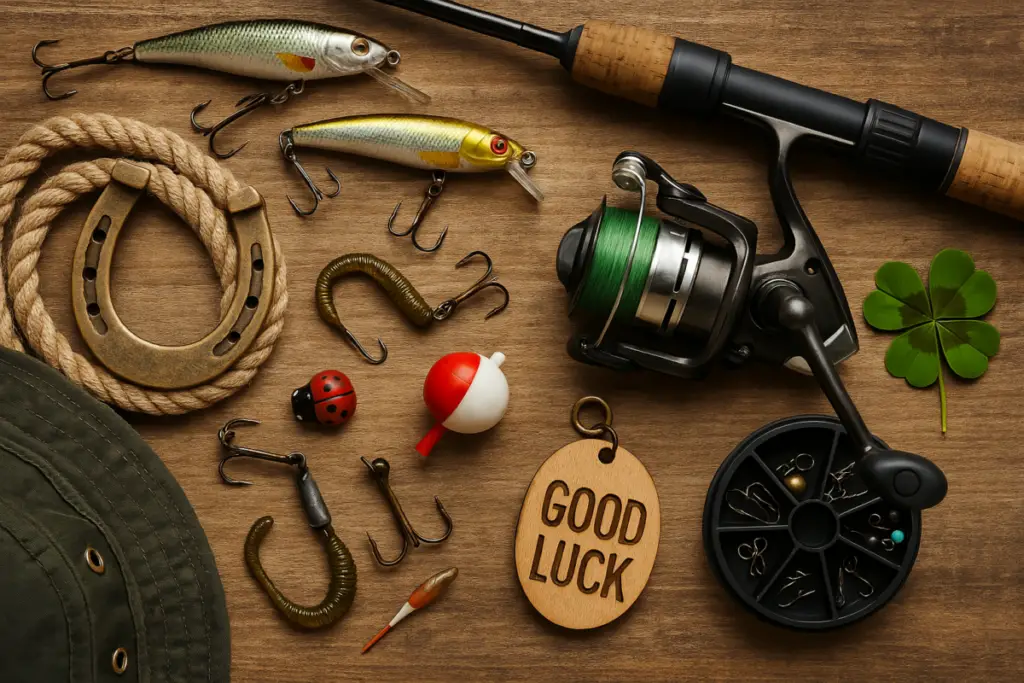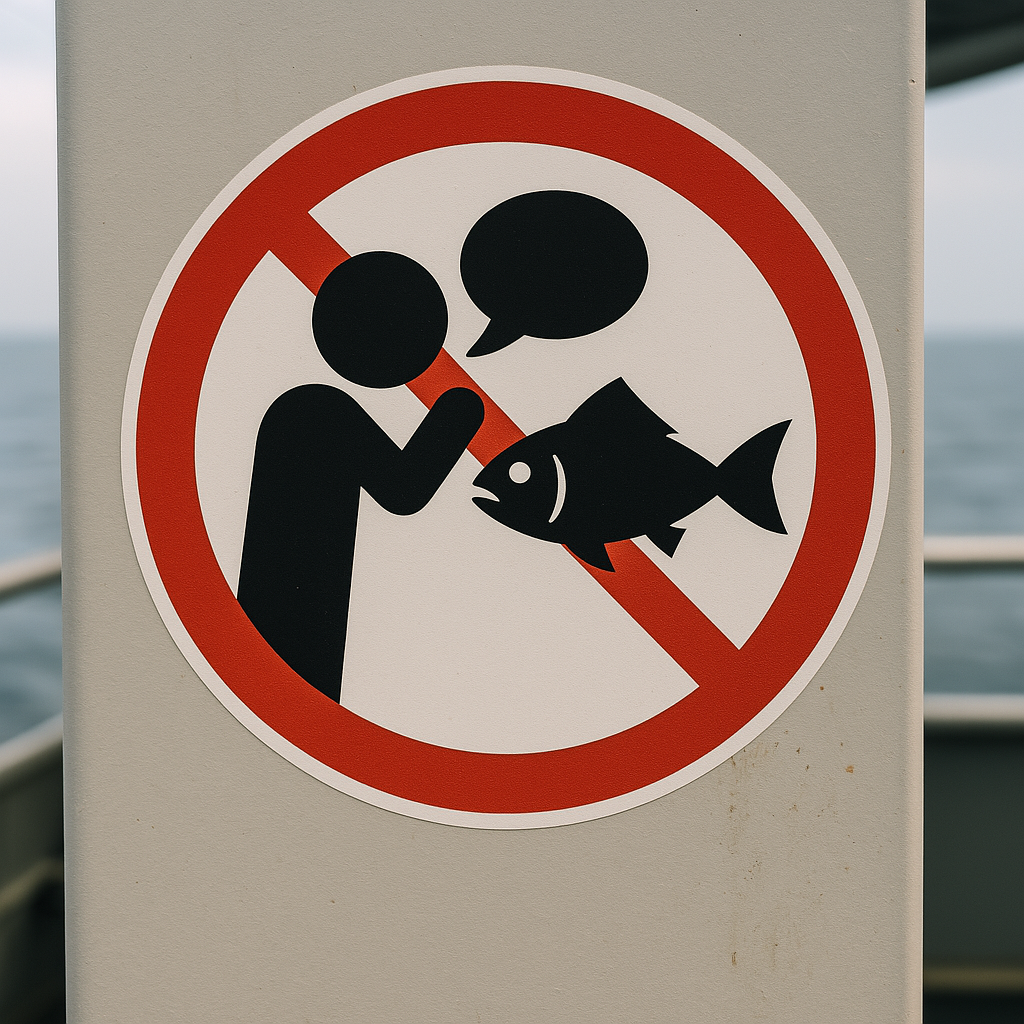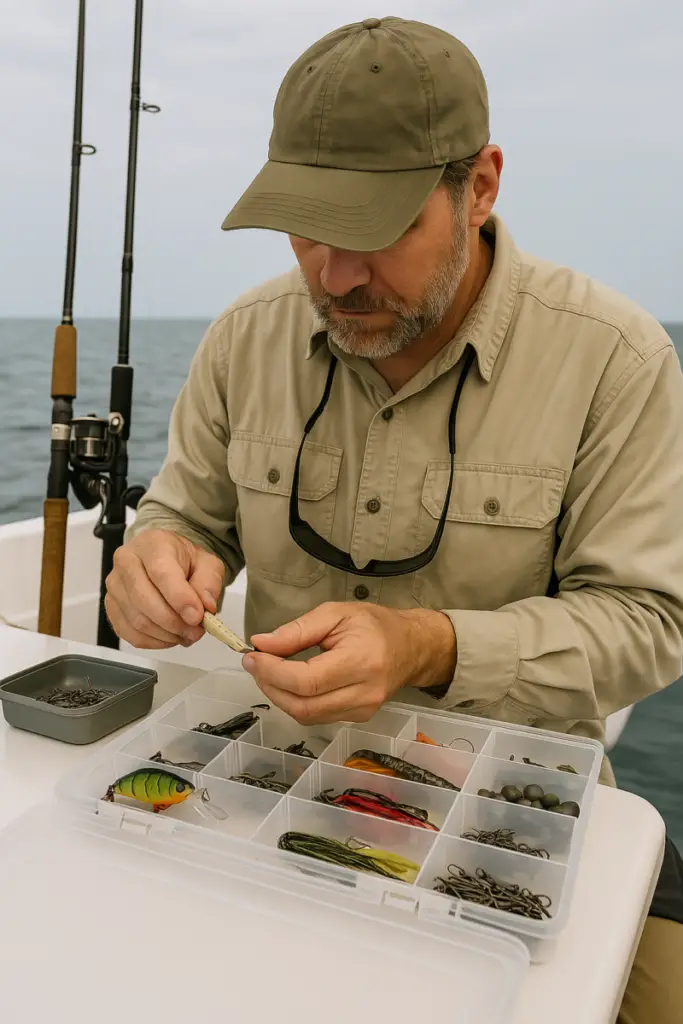
Introduction
You’ve probably heard that bananas on a boat are bad luck or that whistling will scare the fish away—are these just myths, or is there some truth to them? Fishing superstitions are as old as the sport itself, handed down from one generation to the next. While some of these beliefs sound downright ridiculous, others feel oddly convincing, especially when a day on the water doesn’t go as planned.
But what really makes a difference when it comes to catching fish? While fishing superstitions are deeply rooted in tradition, it’s time to separate fact from fiction. Let’s explore the origins of these quirky beliefs, understand why they persist, and see what science actually has to say about them. Whether you’re a seasoned angler or just starting out, this deep dive into fishing myths debunked might just change how you think about luck on the water.
Fishing is more than just a hobby for many—it’s a way of life. And with that passion comes a whole world of beliefs, habits, and rituals that seem to promise better luck on the water. While some swear by their lucky fishing hat or a specific routine before launching the boat, others laugh it off as nonsense. Yet, even the most skeptical anglers can’t help but wonder if there’s a grain of truth in these superstitions.
The Psychology Behind Fishing Superstitions
Why Do Anglers Believe in Superstitions?
Humans naturally look for patterns—especially when success seems elusive. Whether it’s a lucky hat or avoiding bananas, these superstitions serve a purpose beyond just tradition.
- Pattern Recognition: Our brains are wired to find connections, even when none exist. This tendency, known as patternicity, makes superstitions feel credible, especially after a lucky catch. When that one fishing trip goes spectacularly well, and you happen to be wearing that old, faded cap, it’s hard not to believe it brought some luck. This is a classic example of what psychologists call patternicity, the human tendency to see patterns where none exist.
- Sense of Control: When faced with unpredictable outcomes (like catching fish), rituals and beliefs give a sense of agency, creating what psychologists refer to as the illusion of control. Fishing is full of variables—weather, water conditions, and the elusive nature of fish themselves. Having a routine or lucky charm helps anglers feel more prepared, even if logically they know it’s just a comforting habit.
- Comfort in Routine: Repeating rituals, like tapping the rod three times, can mentally prepare anglers, boosting confidence. This practice is akin to how athletes develop pre-performance routines to reduce anxiety and enhance focus. This comfort is especially important on days when the fish just aren’t biting. Sometimes, sticking to familiar routines can make a tough day on the water feel a bit less daunting.
The Role of Tradition and Storytelling
Superstitions often get passed down through generations, wrapped in tales of epic catches and unlucky mishaps. The fishing community thrives on storytelling, where a single lucky charm or a quirky ritual becomes the centerpiece of a legendary tale.
- Folklore Connection: Anglers love sharing stories—especially ones that hint at luck or misfortune. Whether it’s grandpa’s tale of how he caught a record-breaking bass with his “lucky lure” or that one time someone ignored the no-banana rule and caught nothing, these stories stick around.
- Sense of Community: Following a local superstition often bonds anglers, even if they don’t fully believe it. It’s more about tradition and camaraderie than actual belief sometimes. Being part of a group that shares a common ritual makes fishing outings feel more special.
- Story Preservation: Some superstitions, like not counting fish before they’re caught, stick around because they make for great stories. These tales are often passed down, not just for the belief itself but for the joy of telling them.
Key Takeaway: Fishing superstitions aren’t just about catching more fish—they’re a blend of psychology, tradition, and a desire to feel in control. Even when logic tells us they don’t make sense, the stories and the sense of connection they foster keep them alive.

Popular Fishing Superstitions and the Truth Behind Them
The Banana Curse: Why Bananas on Boats Are Considered Bad Luck
One of the most enduring fishing superstitions is that bringing bananas aboard a boat invites misfortune. But where did this belief originate?
- Historical Incidents: In the 1700s, several ships carrying bananas were reportedly lost at sea, leading sailors to associate the fruit with bad luck.
- Rapid Transit: Bananas spoil quickly, prompting ships to hasten their voyages. This speed often hindered successful fishing, as lines couldn’t be trolled effectively.
- Unwanted Pests: Banana shipments sometimes harbored venomous spiders and snakes, posing threats to the crew.
Scientific Perspective: There’s no empirical evidence linking bananas to decreased fishing success. Modern anglers recognize this superstition as more folklore than fact.
Whistling Scares the Fish Away
Another common belief is that whistling or making noise can deter fish. Let’s examine this notion.
- Sound Transmission: Sound travels differently in water than in air. While loud noises above water are unlikely to penetrate the surface, vibrations from banging on the boat can be transmitted underwater, potentially startling fish.
- Boat Noise: Engines and generators produce underwater sounds that might affect fish behavior. Choosing quieter motors can mitigate this.
Key Takeaway: While casual conversation or whistling above water is unlikely to scare fish, sudden noises or vibrations in the water can have an impact.
Lucky Fishing Hats and Rituals
Many anglers have a “lucky” hat or ritual they believe enhances their fishing success.
- Psychological Boost: Wearing a familiar item can boost confidence, leading to more focused and patient fishing.
- Confirmation Bias: Anglers may remember successful trips when they wore their lucky hat and forget unsuccessful ones, reinforcing the belief in its luck.
Reality Check: While these items don’t possess inherent luck, the confidence they instill can positively influence an angler’s approach and persistence.
Bad Luck to Talk About Catching Fish Before You Start
Some believe that discussing potential catches before fishing can jinx the trip.
- Expectation Management: Setting high expectations can lead to disappointment if not met, making it feel like bad luck.
- Mental Focus: Staying present and not fixating on outcomes can lead to a more enjoyable experience.
Insight: While talking about catches doesn’t influence actual outcomes, managing expectations can enhance the fishing experience.

Don’t Count Your Fish Before They’re Caught
This saying emphasizes caution against premature optimism.
- Humility Reminder: Fishing is unpredictable; overconfidence can lead to disappointment.
- Focus on Process: Concentrating on technique rather than outcomes often yields better results.
Conclusion: Patience and humility are virtues in fishing, reminding anglers to stay grounded and enjoy the process.
Understanding these superstitions offers insight into the rich tapestry of fishing culture. While many are rooted in historical contexts, it’s essential to differentiate between tradition and tangible factors that influence fishing success.
Practical Tips: Superstitions That Actually Make Sense
Preparation Rituals That Improve Focus
While many fishing superstitions are rooted in folklore, some practices offer practical benefits that can enhance your fishing experience. By understanding the rationale behind these rituals, anglers can adopt habits that improve focus, reduce disturbances, and foster camaraderie.
Preparation Rituals That Improve Focus
Engaging in pre-fishing rituals can help anglers mentally prepare for the day ahead. These routines create a sense of control and readiness, which can be beneficial in a sport where many variables are unpredictable.
- Organizing Gear: Systematically arranging tackle and equipment ensures that everything is in place, reducing stress and allowing for quick adjustments on the water.
- Affirmations: Repeating positive statements can promote a focused and confident mindset, enhancing overall performance.
- Mindfulness Practices: Techniques such as deep breathing or visualization can help center attention and alleviate pre-trip anxiety.
Key Takeaway: Establishing consistent preparation rituals can lead to improved concentration and a more enjoyable fishing experience.

Sound Management on the Water
While the belief that talking or whistling scares fish away is largely a myth, managing noise levels can still play a role in fishing success. Understanding how sound travels in aquatic environments helps in minimizing potential disturbances.
- Underwater Acoustics: Sound travels faster and more efficiently in water than in air. Loud noises, especially those that create vibrations, can potentially startle fish.
- Boat Noise: Sounds from engines, dropped objects, or movement on the boat can transmit into the water. Minimizing such noises can reduce the chances of spooking fish.
- Conversational Volume: Normal talking is unlikely to affect fish behavior significantly. However, shouting or loud disturbances may have an impact, particularly in shallow waters.
Practical Tip: Maintain a moderate noise level and be mindful of actions that produce vibrations to create a more favorable fishing environment.
Respecting Local Traditions
In many fishing communities, local superstitions and traditions play a significant role in the cultural fabric. For instance, in certain regions, it’s considered bad luck to mention certain animals, like rabbits or pigs, while on a fishing trip. While these beliefs may not have scientific backing, adhering to them demonstrates respect for local customs and can foster camaraderie among fellow anglers. Being mindful of and participating in these traditions can enhance the overall fishing experience and strengthen community bonds.
Key Takeaway: While many fishing superstitions stem from folklore, some practices offer tangible benefits. Engaging in preparation rituals enhances focus, maintaining silence can prevent disturbing fish, and respecting local traditions fosters community and enriches the fishing experience.
The Harm in Believing Too Much
While superstitions can offer comfort and a sense of control, overreliance on them may hinder personal growth and performance. Understanding when these beliefs become detrimental is crucial for any angler aiming to improve their skills.
When Superstitions Become a Crutch
Athletes often develop rituals to manage anxiety before competitions. These rituals, while providing temporary relief, can become problematic if they overshadow the development of actual skills. For instance, a study highlighted that such behaviors might indicate underlying stress or obsessive tendencies.
In the context of fishing, relying solely on a “lucky” lure without honing techniques like casting accuracy or understanding fish behavior can limit an angler’s success. It’s essential to balance traditional beliefs with continuous skill enhancement.
Expert Advice: Sports psychologists emphasize the importance of distinguishing between beneficial routines and restrictive superstitions. Developing a growth mindset—focusing on effort and learning rather than fixed beliefs—can lead to better performance and personal satisfaction.
Breaking the Cycle of Belief
Challenging ingrained superstitions requires intentional effort and a willingness to experiment.
- Test the Superstition: Deliberately bring a banana on board or whistle while fishing to observe any real impact on your success rate. This empirical approach can help debunk myths and reduce undue reliance on them.
- Maintain a Fishing Journal: Documenting each trip, including conditions, techniques used, and outcomes, allows for objective analysis. Over time, patterns may emerge that highlight the true factors influencing success, independent of superstitious practices.
- Seek Feedback: Engage with fellow anglers or mentors to gain insights into effective techniques and strategies. External perspectives can provide valuable guidance and help shift focus from superstition to skill.
Key Takeaway: While traditions add richness to the fishing experience, grounding one’s approach in skill development and evidence-based practices fosters genuine improvement and confidence.

Frequently Asked Questions (FAQs)
Q1: Do any fishing superstitions actually work?
While many fishing superstitions stem from folklore and lack scientific backing, some practices may have practical benefits. For instance, maintaining a quiet environment by avoiding loud noises can prevent startling fish, thereby improving catch rates. However, most superstitions serve more to provide anglers with a sense of control rather than directly influencing fishing success.
Q2: What’s the most common fishing superstition?
The belief that bringing bananas on board is bad luck is among the most widespread fishing superstitions. This notion dates back to the 1700s when sailors associated bananas with various misfortunes at sea, such as ship disappearances and pest infestations. Despite its prevalence, there’s no scientific evidence supporting this superstition.
Q3: Why are bananas considered bad luck on boats?
The superstition surrounding bananas on boats likely originated from historical incidents where ships transporting bananas faced unfortunate events. These included rapid spoilage of bananas leading to hurried voyages with little time for fishing, and the presence of pests among banana cargo causing problems for the crew. Over time, these associations contributed to the belief that bananas bring bad luck aboard.
Q4: How do I break the habit of following fishing superstitions?
Overcoming reliance on fishing superstitions involves a conscious effort to focus on skill development and evidence-based practices. Consider the following steps:
- Educate Yourself: Learn about fish behavior, effective techniques, and environmental factors that influence fishing success.
- Experiment: Challenge superstitions by deliberately disregarding them and observing the outcomes. For example, bring a banana on board and note if it affects your catch.
- Maintain a Fishing Journal: Document your fishing trips, including conditions, methods used, and results. Over time, this can help identify what truly impacts your success.
- Seek Mentorship: Engage with experienced anglers who prioritize skill over superstition. Their insights can provide valuable guidance and reinforce confidence in practical techniques.
By shifting focus from superstition to skill and knowledge, you can enhance your fishing experience and success rates.
Conclusion
Fishing superstitions, from the infamous banana taboo to the belief that whistling can deter fish, have been woven into the fabric of angling culture for generations. These traditions often stem from historical anecdotes and the human desire to find patterns in unpredictable environments. While they add a layer of charm and camaraderie among anglers, it’s essential to recognize that skill, preparation, and understanding of the environment are the true determinants of fishing success.
By critically examining these superstitions and balancing them with practical fishing techniques, anglers can maintain the rich tradition of storytelling while also enhancing their catch rates. While there’s nothing wrong with holding onto a lucky hat or avoiding bananas on board, it’s important to ground one’s approach in proven methods and techniques. Embracing a mindset that values growth and learning over superstition allows for more consistent success and personal satisfaction on the water.
Ultimately, fishing is as much about the experience as it is about the catch. Whether superstitions play a role or not, what truly matters is the joy of being out on the water, sharing stories, and striving to become a better angler. A balanced approach, where tradition meets skill, ensures that fishing remains a rewarding pursuit, filled with both memories and achievements.
